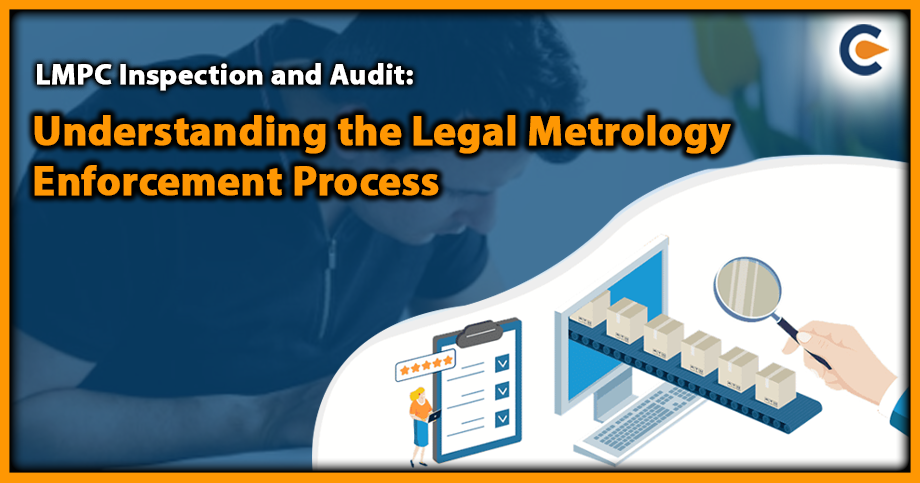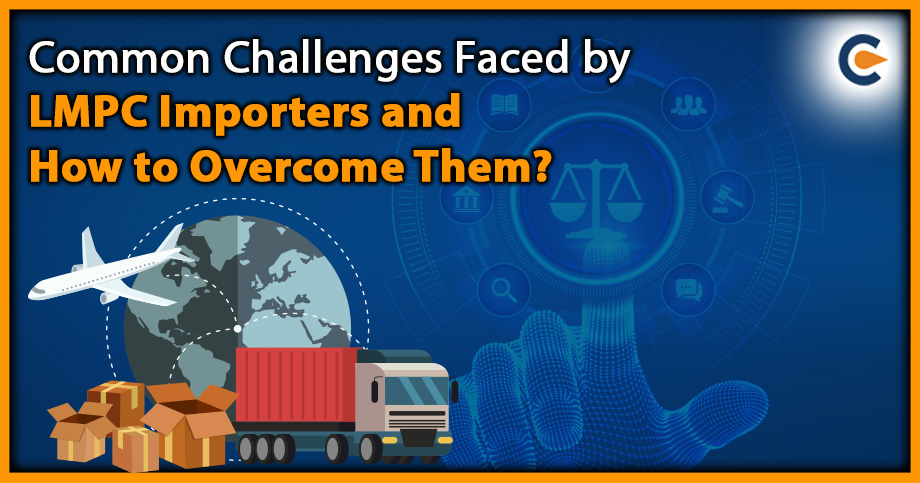LMPC inspection and Audit is a method to monitor, review and check whether the organization or any firm that conducts Audit complies with the rules and regulations of their businesses to maintain the goodwill of the product. Every Legal Metrology officer of the legal metrology department is authorized to inspect the pre-packaged commodity for quantity, quality and error or misrepresentation in packages at the premises of the wholesale or retail dealer. The officers check whether the wholesale or retail dealer of the pre-packed commodity shall comply with all the legal metrology packaging rules and regulations as per the Indian legal metrology system. The commodity’s manufacturer, importer, or packer shall obtain LMPC Registration, the LMPC certificate, and LMPC License.
What Does LMPC Auditing Mean?
The Auditing ensures that the pre-packaged commodities’ manufacturers and dealers act upon the rules and regulations of LMPC and Legal Metrology. The following are the activities of the auditor that undergoes legal metrology auditing.
- The auditor’s first and foremost duty is to check and verify whether the product and package of the commodities are in accordance with the compliance of the Legal Metrology Packaged Commodities rules.
- The auditor verifies whether the manufacturer and dealers have complied with the rules of LMPC regulation along with other regulations such as the Companies Act, Environment Impact Assessment, etc.,
- Verification of existing license and other related documents under the Legal Metrology Act.
- Verification of other complete compliance under LMPC.
- Verification of warehousing license and others.
- If the firm is an E-commerce company, then verification and review of the E-commerce registration certificate and license certificate.
- The auditor checks under Legal Metrology (numeration) rules, 2011. Checking for the manner in which the number shall be written is mandatory.
- Under Legal Metrology (approval of model) rules, 2011, the auditor checks whether the authorities duly approve the model.
- Verifies the compliance of stamping of weight and measure under the Legal Metrology Act.
- Whether the compliance related to the principle display panel is done correctly as per the LMPC rules.
- Checks the LM (national standards) rules to verify that all products are packaged based on the base standards such as mass, volume, length etc.
- Verification of manufacturing and printing of labels.
Inspection of the Officer Regarding the Quantity and Errors in the Package
The LMPC inspection from Legal metrology officers can be done in the form of a quality check or test in relation to the net quantity contained in a package. It shall be carried out at the premises of the retail or wholesale dealer or wholesale dealer in the following situations.
- The inspection by the director, the Controller, or any other legal metrology officer is done after receiving the compliant that the package sold or delivered to the complainant where the consumer does not contain the quantity declared on the package’s label.
- The director, Controller, or any other legal metrology officer suspects that any package has been damaged or opened or that any leakage of the commodity contained in the package.
- If the director or the Controller of any legal metrology officer found any package or any label affixed in the package does not bear on all or any LMPC declaration on the package, which is required to be made under the rules of the LMPC act and in case the manufacturer does not comply with the legal metrology packaging rules the inspection will be based on the violation of the law.
- The inspection is done based on a specific test that was carried out according to the provision of the Act. The following are the verifications done by the Controller or any other legal metrology officer.
- The inspection is done based on the quantity contained in the package relates to the quantity declared on the package or any label affixed to the package.
- Whether the quantity contained in the package is less than the declared quantity in the package.
- Inspects if the deficiency is more than the minimum permissible error that any commodity can have.
- Suppose the Controller or any other legal metrology officer finds in a test. In that case, he carries that the dealer has more than the maximum permissible error or deficiency in the package kept for sale, distribution, or delivery at the premises of the retail or wholesale dealer. In such cases, the legal metrology officer shall seize such a package and take appropriate action against the offender, who may be the retail or wholesale dealer.
- During the inspection, if the officer found the package bearing the word “when packed”, no action shall be taken against the retail or wholesale dealer. If they are satisfied after the entire necessary test that the deficiency in the net quantity contained in the package is due to environmental conditions.
- In the inspection procedure, if it is found that any package or any label affixed in the package does not declare the required information to be made on the package, it shall be lawful for the Controller or any other legal metrology officer to make a such inquiry about the manufacturers.
The objective of LMPC Inspection and Audit for Legal Metrology Laws
The following are some objectives for conducting LMPC inspection and audit of weights and measures and packaged commodities.
- The effective, timely LMPC inspection and audits conducted help to establish the preparation of Annual plans with an imperative perspective.
- The Auditing ensures mandatory licensing, Calibration, Verification, Stamping, and Enforcement of applicable laws in the country, indirectly assuring the company’s credibility among the customers.
- The timely LMPC inspection and audit monitoring and evaluations ensure no defects or faults in the weights and measurement instruments.
- The Auditing affects the financial management of the Legal Metrology Department for being efficient, economically feasible, and effective in accordance with the financial provisions.
Understanding the Legal Metrology Enforcement Process – LMPC Inspection and Audit
The following are the enforcement processes the Legal metrology department must ensure while performing LMPC inspection and audit.
Steps for Licencing of Manufacturer, repairer and Dealer of Weights and Measures:
The following are the steps that an LMPC inspection and audit person should consider while auditing the license of the dealers.
- Every manufacturer, repairer, or dealer in weight or measure must apply to the Controller legal metrology or any other officer authorised on his behalf in the issuance of such licence.
- Every manufacturer or repairer, or dealer in weight or measure is necessary to make an application for the renewal of a licence within thirty daysprior to the validity expiry of the earlier licence.
- The licence issued to a manufacturer, repairer or dealer shall be in the appropriate form mentioned in Schedule III of the Act.
- The licence issued to a manufacturer, repairer, or dealer shall be valid for a minimum of one to a maximum of five years after that when such dealers have to renew their license.
- The fee for the alteration of a licence or the issue of a duplicate licence shall be one-half of the licence fee as specified in Schedule IVof the Act.
- The Controller or any other officer as may be authorized by him on his behalf as per Schedule 5 of the Act shall maintain a register of licenced manufacturers, dealers and repairers for verification purposes.
- The manufacturer / repairer / dealer licenced under the Act should maintain such workshop / equipments / tools/ registers etc., as per the conditions of the licence.
- Every repairer licenced under the Legal Metrology Act should furnish a security deposit to their respective State Government for each licence.
- The licence issued or renewed under this Act shall be displayed in a proper place in the principal premises where the licensee carries on business.
- Under this Act, a licence issued or renewed shall not be salable nor transferable.
Conditions for Suspension and Cancellation of the Licence Granted
Following are the conditions for suspension and cancellation of the license granted:
- The Controller or any other officer on his behalfmay suspend the license if he believes that the holder of any licence issued, renewed or continued under this Act has got the license through false material facts or has contradicted any provision of the Act or order this Act.
- The Controller or any such other officer authorized by him on his behalf may cancel the license if he thinks fit after making such inquiry with the license holder who has made any false or incorrect statement of the nature referred to in sub-rule (1) of the Actor has contravened any law or order referred to in that subsection.
- Every person, manufacturer, or dealer whose LMPC licence has been suspended shall immediately stop functioning as a licensee and shall not resume business as a license holder until the order of such suspension has been, or stands, vacated.
- The owner whose licence has been suspended or cancelled should surrender the such licence to the authority.
What Are The Records To Be Maintained By Manufacturers As Per The Rules?
Every manufacturer, repairer, or dealer in weight or measure licenced under the Act should maintain records and registers and submit such periodical reports/returns to the authority.
Necessary Periodical Interval for the Authorities’ Verification of Weights or Measures
- The legal metrology officer shall verify and stamp every weight or measure used in any transaction.
- Every weight or measure verified and stamped in situ shall be dismantled and re-installed.
Verification and Inspection of Weights or Measures
The following are the steps that an LMPC inspection and audit person should consider while inspecting the weights and measures of the dealers.
- Every person or manufacturer who is using any weight or measure for a transaction should present such weight or measure for verification.
- To verify the weight or measure referred to in sub-rule (2), the user should provide such facilities in his premises as specified by the Controller.
- Every weight or measure presented for verification by the dealer shall be complete.
- The weight or measure should be verified in a clean condition. The Legal Metrology officer shall require the proprietor or user to make necessary arrangements if necessary.
- During the inspection, the legal metrology officer shall cancel the stamping on any weight or measure if any weight or measure due for re-verification has yet to be submitted.
Stamping of Weights and Measures
The Legal Metrology officerwill stamp every weight or measure if satisfied after testing and verifying that the weight or measure is to the standards established by the Act.
Disposal of Seized Weights, And Measures to the Respective Persons
The following are the steps that an LMPC inspection and audit person should consider while auditing the papers of the dealers
- Any unverified weight or measure shall be returned to the person or manufacturer from whom such weight or measure was seized if that person gets the same verified and stamped within 15 daysof the return.
- If the officer seizes any weight or measure or document or thing or goods seized and detained under section 15 of the Act, which is to be the subject of proceedings in a court, it shall be dealt with in accordance with the orders of the court.
- Suppose any goods seized under section 15 of the Act are subject to speedy natural decay. The legal metrology officer with the goods shall obtain the signature of the trader who committed the offence.
- When the goods seized under sub-section (1) of Section 15 of the Act are contained in a package, and the package is false or not comply with the provisions of the Act, which is subject to speedy or natural decay, the legal metrology officer may dispose of the goods in such package under the provisions of sub-rule (3)
- Where the goods seized under sub-section (1) of Section 15 of the Act are not subject to speedy decay, the legal metrology officer may retain the package for the purpose of prosecution under this Act after giving the trader a notice of such seizure. In cases which are not to be the subject of proceedings in a court, after the expiry of sixty days of its seizure, the Controller may deal with it as directed by the court.
Validity of Weights or Measures Duly Stamped By the Authority
- A weight or measure duly verified and stamped under this Rule shall be deemed to conform to the standards at every place within the State in which it is stamped.
- No weight or measure that is duly verified and stamped under this Act shall require to be re-stamped for the reason that it is used at any place within the State other than the place at which it was initially verified and stamped.
Qualifications of Legal Metrology Officer
A person who is appointed as a legal officer should possess the following qualification.
- The person should be a graduate of a recognized university in Science, technology or engineering or holds a recognized diploma in engineering with three years of professional experience.
- The person should be able to speak, read and write at least one of the regional languages of the State.
- The person appointed to the Legal Metrology Officer post must successfullycomplete the basic training course at the Indian Institute of Legal Metrology established by the Federal Government under section 11 of the Act.
Provisions Relating To the Use of Weights Measure
The following are the steps that an LMPC inspection and Audit should follow while inspecting the usage of weights and measures.
- Every weight or measure shall be used in a clean condition and with a proper lighting arrangement.
- To ensure a proper check of the accuracy of a weighing instrument, the user shall keep at the site of each weighing instrument duly verified and stamped weights equal to one-tenthof the instrument’s capacity, and the consumer can also check the accuracy of the weighing instrument.
Penalty for Contravention of Rules
Whoever contravenes any provision of these rules or does not abide by the rules and regulation of the Act, if that contravention of which no punishment has been separately provided in the Act, then they shall be punished with a fine up to Rs.5000.
Conclusion
The purpose of the LMPC Act is to ensure that the manufacturer, importer or dealers should comply with the rules and regulations laid down under the Act to keep themselves away from legal metrology disputes and penalization. The authorized Legal Metrology officer has the right to inspect the unit as per the complaint from the customer or to provide a license to the dealer. The LMPC inspection and Audit play an important role in ensuring the importer, dealer or manufacturer to comply the rules and regulations of LMPC[1].
Read Our Article: Understanding The Legal Metrology Act And Rules For LMPC Importer License











